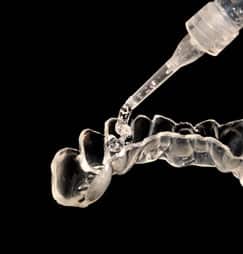Most people have heard of fluoride and know that it is a common ingredient in toothpaste. Others think that fluoride is only important for children. This blog explains why fluoride is great for people of all ages because of the wonderful benefits it provides for the teeth. 
Lowers Your Risk for Cavities
The biggest benefit of fluoride, and the one heralded by the Center for Disease Control as one of the greatest medical innovations of the 20th century, is its ability to lower the risk for cavities. Before water contained fluoride, people suffered a much higher rate of tooth decay and loss due to extensive decay. After communities began adding fluoride to water, the prevalence of cavities dropped dramatically.
Fluoride is a naturally occurring mineral that incorporates itself into the mineral matrix of tooth enamel and dentin (the core tooth structure underneath enamel). Having fluoride as a part of the mineral content of teeth makes them harder and less susceptible to cavity-causing bacteria.
Anyone with a high risk for forming new cavities should talk to his or her dentist about professional fluoride treatments.
Protects Teeth against Acid Erosion
Enamel is the hardest substance in the human body, but it is not invincible. The one thing that seriously damages enamel is acid. People with severe acid reflux or frequent vomiting have a very high risk of acid erosion, in which the enamel slowly wears away. Acid dissolves tooth enamel just as it etches glass.
Enamel that contains fluoride is harder and stronger. You can still experience acid erosion on teeth with fluoride, but it takes a much stronger acid and a longer exposure time to cause damage. By adding fluoride, you are protecting your teeth against the dissolving effect of strong acids.
Anyone who suffers from GERD, severe acid reflux, or frequent vomiting should speak with his or her dentist about professional fluoride applications.
Fights Tooth Sensitivity
Fl uoride works on both enamel and dentin (enamel’s underlying structure) to harden and strengthen them against damaging forces from acids and bacteria. This becomes a factor in fighting tooth sensitivity when a person has receding gums. As gums recede, they expose the roots of teeth to the oral cavity with all of its bacteria, foods and drinks, instead of protecting and covering them as the gums should. The roots of our teeth do not have an enamel coating, so when gums recede, the exposed surface is mainly dentin. Dentin is softer than enamel and contains tiny pores that communicate between the nerve within the tooth and the rest of the mouth. That is why you may experience pain when you drink something ice cold and have gum recession.
uoride works on both enamel and dentin (enamel’s underlying structure) to harden and strengthen them against damaging forces from acids and bacteria. This becomes a factor in fighting tooth sensitivity when a person has receding gums. As gums recede, they expose the roots of teeth to the oral cavity with all of its bacteria, foods and drinks, instead of protecting and covering them as the gums should. The roots of our teeth do not have an enamel coating, so when gums recede, the exposed surface is mainly dentin. Dentin is softer than enamel and contains tiny pores that communicate between the nerve within the tooth and the rest of the mouth. That is why you may experience pain when you drink something ice cold and have gum recession.
Fluoride hardens the dentin and shrinks those tiny pores, allowing less communication between the nerve and the mouth’s environment. Anyone with sensitive teeth should speak to his dentist about adding a professional fluoride treatment to his dental visits.
Keeps Teeth Strong through Teeth Whitening Process
Everyone wants whiter teeth. And we have the means to accomplish that with both professional and over-the-counter teeth whitening products. One of the risks associated with teeth whitening is a decrease in the hardness of enamel. This may result in tooth sensitivity and a possible increased risk for cavities.
Fluoride can quickly and effectively counteract this decrease in hardness. In fact, some of our professional teeth whitening gels contain fluoride incorporated directly into the gel itself.
Anyone who is undergoing teeth whitening should speak to her dentist about how professional fluoride treatments can fight sensitivity and keep the teeth strong throughout the whitening process.
More Questions about Fluoride and How it could Help You?
Call today to schedule a consultation with one of our dentists, who can answer any question about your specific risk areas and how fluoride could benefit you!


Comments are closed.